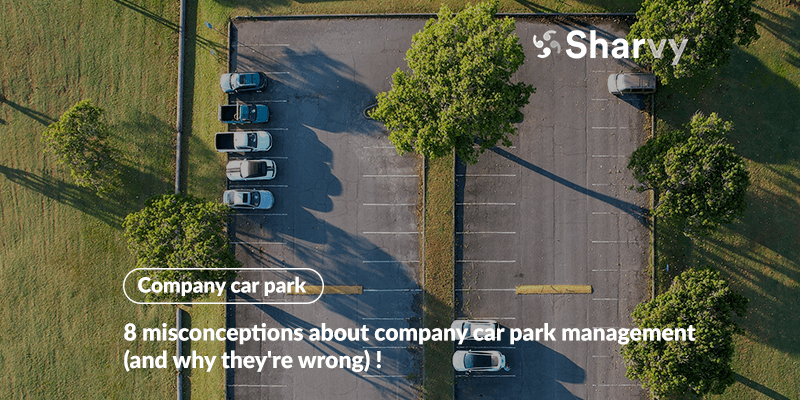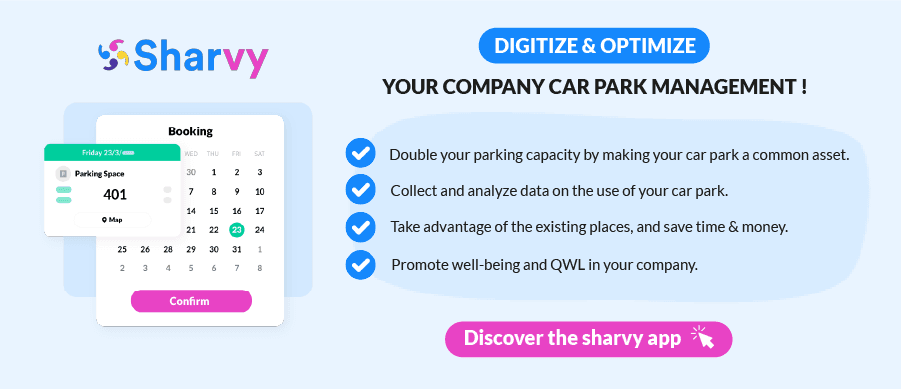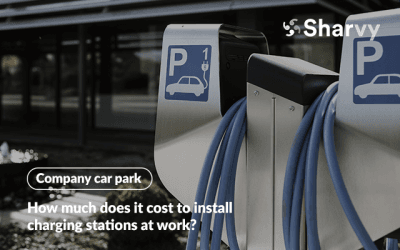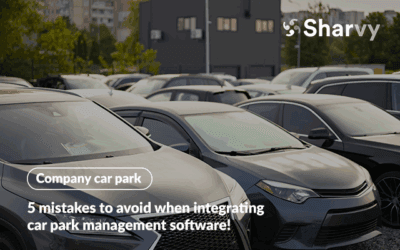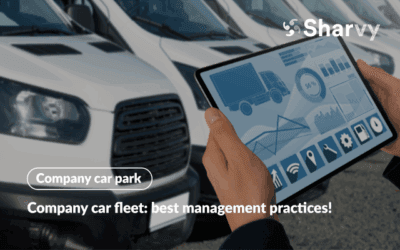When we think of Quality of Life at Work (QWL), we often think of teleworking, ergonomic offices and flexible hours, but rarely of company car parks. And yet, for many employees, the daily struggle to find a parking space can be a major source of stress.
Ironically, parking management is still seen as a secondary, almost anecdotal issue, even though it has a direct impact on organisation, fairness and even the company’s image.
In discussions with HR managers, office managers and employees themselves, one point often comes up: « Company car parks are a real headache, but that’s the way it is ». This sense of resignation is partly due to the persistence of certain misconceptions.
So let’s get to the bottom of it! In this article, we take a look at the main preconceptions surrounding company parking, to confront them with reality andexplore how to move towards more modern (and fairer) management.
1. « A company car park is just a place to park cars ».
This is probably one of the most persistent ideas when it comes to company car parks. It’s a purely functional place, with no real added value. But this view is outdated (and even counterproductive).
The car park is often the first and last point of physical contact between an employee and his or her company during the day. What happens there (and what doesn’t) influences their mood, stress, punctuality and even their perception of the company.
A bad experience(lack of space, absence of clear rules, perceived favouritism) can generate frustration even before the working day begins. Conversely, a fluid, transparent & fair parking system contributes to a better working atmosphere & a feeling of recognition.
It’s also a strategic management tool. Managing a car park is not just about allocating spaces: it’s about optimising a costly resource (land, security, maintenance), adapting supply to actual demand, and anticipating changes (teleworking, flexibility, new uses).
With the right tools (on-demand reservations, dynamic management, pooling), a company can maximise the use of its space without necessarily creating new spaces.
✔️ Our point of view: company car parks are an indicator of corporate culture. It reflects the way in which the organisation manages fairness, its attention to detail, and its ability to innovate on concrete issues. Neglecting to manage it is often a sign of unbalanced management. Valuing it sends a clear message: the employee experience counts.
2. « First come, first served: it’s fairer ».
At first sight, this received idea may seem attractive because of its simplicity, but it does not guarantee true fairness. It amounts to saying that the person who arrives first has an advantage, which seems legitimate in many situations (e.g. queuing for a ticket). Everyone has the same chance of getting there first, so on paper no one is favoured.
However, this idea masks a number of less obvious realities.
Firstly, it ignores the inequalities between employees at the outset. Not everyone can arrive « first » in the same way: some don’t have the time flexibility, others have family constraints, transport problems or health problems that limit their ability to turn up in advance.
To say that it’s fair is to forget that access to the first row is not the same for everyone, and that this rule often favours those who already have a social or material advantage. This system can therefore widen the gaps rather than narrow them.
What’s more, this method sometimes leads to pointless competition, where the aim is no longer to get what you need, but simply to be the fastest. This can create stress, frustration & tension between colleagues, especially in contexts where resources (in this case: parking spaces) are limited.
Finally, it should be stressed that fairness does not necessarily mean applying the same rule to everyone, but rather recognising differences & adjusting criteria according to needs and situations.
✔️ Our point of view: At Sharvy, we believe that fairness cannot be reduced to a rigid chronological logic. This principle often favours those who are most available, not necessarily those who have the highest priority. That’s why our algorithm allocates parking spaces more fairly, taking into account car park usage history (last 60 days), personal constraints (pregnant women, people with reduced mobility, etc) and a credit system. In this way, everyone has a real chance of accessing the resource, according to their needs and not their speed.
3. « Teleworking means less need for parking spaces ».
Indeed, if some employees work from home on certain days of the week, it might be thought that company car parks are now largely underused. Fewer people on site = fewer cars = less need for parking spaces… in theory.
But in reality, things are much more nuanced. Nowadays, the days spent on site are often concentrated: employees choose to come to the office on the same days (often in the middle of the week), which results in a high level of traffic at certain times, and a highly variable occupancy rate from one day to the next.
The result is that on some days the car park is virtually empty, while on others it is saturated, with employees having to spend a long time looking for a space, and sometimes leaving frustrated.
What’s more, in this hybrid environment, fixed parking spaces allocated on a year-round basis are no longer appropriate. A space can remain empty for several days, when it could have been used by others. The result is a waste of space that is neither practical, profitable nor sustainable.
Finally, it should be stressed that the need to come by car does not disappear with teleworking. Public transport is sometimes unsuitable, expensive and unreliable, depending on the area. Some people continue to prefer their own car, especially when they only come two days a week and want to optimise their journey.
✔️ Our point of view: Teleworking makes company car parks more complex to manage, and highlights the absurdity of maintaining fixed spaces, often reserved for executives & managers, who are most frequently on the move, in external meetings or teleworking. As a result, these spaces remain empty while other employees struggle to find parking. It’s time to move to more flexible, shared and fair parking management, where everyone is allocated a space according to their actual presence, and not according to their hierarchical status. That’s what the Sharvy solution makes possible!
4. « There aren’t enough parking spaces, there’s nothing we can do about it ».
This line of thinking reflects a feeling of powerlessness that is quite common in companies faced with a shortage of parking spaces. It is based on the idea that the problem is purely physical : if there are only 50 spaces for every 100 employees, then there will always be a shortage.
Faced with this logic, we often conclude that there is no solution, unless we build a new car park (which is costly, time-consuming and sometimes impossible, depending on the constraints of the site).
But this perception overlooks an essential reality: the problem is not the lack of spaces, but rather their poor management. In many companies, some spaces are allocated all year round to people who only come to the office two or three days a week, or even less!
The result is that many spaces remain unoccupied for a large part of the time, while other employees are driving in circles to find parking. This under-utilisation of the car park is very common, and is often invisible, because the spaces are « reserved » and not shared.
What’s more, the lack of a real-time reservation and monitoring system exacerbates the situation. Without a suitable solution, it is difficult to know who will be there, who really needs a space, and how to optimise existing availability. The impression of saturation therefore often comes from rigid and opaque management, not from a lack of places.
✔️ Our point of view: Saying that nothing can be done is often a reaction to a rigid system. But in reality, better organisation opens up unsuspected room for manoeuvre. The real challenge is not just the number of places, it’s ensuring that they benefit those who need them, at the right time.
5. « Reserving places is too complex to put in place ».
This fear is understandable: the fear of adding a layer of management and technology that could disrupt habits and make the day-to-day work of employees and general services more cumbersome. It’s easy to imagine a system that would be cumbersome, time-consuming and difficult to understand, leading to frustration and conflict.
However, this supposed complexity often stems from a lack of knowledge of existing solutions and poorly managed past experiences. Reserving a parking space should be no more complicated than booking a day off.
In reality, it is often the systems without reservation (with fixed & non-shared spaces) that generate the most stress & inefficiency. Employees go round in circles looking for a place, some monopolise the space, others feel cheated. This vagueness fuels frustration far more than a reservation system.
A good reservation system is based on 3 key elements:
- Simplicity (just a few clicks).
- Transparency (everyone can see what’s available).
- Fairness (equal footing, no privileges based on subjective criteria).
It’s not the technology itself that’s complex, it’s the way it’s designed and integrated into everyday use.
✔️ Our point of view: We believe that the real complexity lies in continuing to manage parking spaces in companies without tools, in a state of confusion, with conflicts and poorly used resources. A well-designed reservation system doesn’t make management more cumbersome, it makes it smoother, fairer and calmer for everyone.
6. « Company car park management only concerns general services ».
This is a very compartmentalised view of responsibilities within a company. Admittedly, general services (and technical/logistics services) are often in charge of the operational aspect: maintenance, security, access control to the car park, etc. But to reduce the subject of parking to a simple logistical issue is to neglect its much wider impact, both on the employee experience and on collective performance.
Parking has a direct impact on employees’ day-to-day lives: arriving at the office stressed out after having spent 20 minutes trying to find a parking space, or having to leave early so as not to miss an available space, are all irritants that have a detrimental effect on well-being, punctuality and even motivation.
So it’s just as much a matter for human resources (QWL), management (mobility policy) and the CSR team (optimising use, encouraging alternative solutions).
Car park management, especially in a context of teleworking and flex office, is therefore becoming a strategic lever for steering the organisation of work, supporting equity between employees, and improving fluidity within the company.
To make this a purely technical issue is to miss an opportunity to take concrete action on the commitment and coherence of internal policies.
✔️ Our point of view: In our view, car park management goes well beyond the scope of general services. It’s a cross-cutting issue that affects mobility, well-being, equity and value for money. It therefore deserves to be addressed by HR as well as by CSR and general management.
7. « All you need is a security guard and a barrier to manage access to the car park ».
This common misconception oversimplifies a much more complex issue. It’s true that a security guard can control badges and a barrier can regulate entry, but this method is often time-consuming and inflexible.
Manually managing who can and can’t enter, checking badges, dealing with oversights and errors is time-consuming and sometimes generates unnecessary tension.
What’s more, this system doesn’t take account of fluctuating needs: who’s really there that day? Who has booked a place but doesn’t turn up (no-shows)? The simple presence of a security guard does not solve these organisational issues, nor does it ensure fairness between employees.
Today, more modern solutions such as cameras with number plate recognition offer much smoother and more automatic management.
They can identify authorised vehicles in real time, without human intervention, and adapt access according to defined rules (for example, according to bookings and priorities on the Sharvy application). This lightens the load on teams, reduces errors and considerably improves the user experience.
✔️ Our point of view: Badge-based management can quickly become cumbersome and frustrating. To meet today’s challenges, we need to focus on intelligent, automated systems, such as number plate recognition, that make life easier for everyone.
8. « A good car park should be 100% full ».
At first glance, it seems logical to think that to make a car park profitable, all the spaces must be occupied at all times. However, this idea overlooks an essential aspect: a maximum occupancy rate does not necessarily mean efficient & satisfactory management.
A 100% saturated car park can quickly become a source of stress and tension for users. With no margin for error, the slightest absence or delay leads to an immediate shortage, with staff driving around in circles looking for a space, wasting time and ending up abandoning their vehicles elsewhere.
What’s more, full occupancy leaves no room for one-off & specific needs, such as visitors, partners & emergencies.
What’s more, in a professional context where attendance varies from day to day (teleworking, off-site meetings, flexible working hours), systematically aiming for 100% occupancy is often tantamount to ignoring the need for flexibility.
Intelligent management will favour an optimum occupancy rate, often around 85-90%, which guarantees both good use of resources and a minimum of fluidity for users.
✔️ Our point of view: We believe that a good car park does not have to be full to bursting. The aim is not to fill every space, but to give everyone easy access to a space when they need it, without frustration or loss of time. Reasoned and fluid use is better than total saturation, synonymous with stress and conflict. So the challenge is to optimise use, not just maximise occupancy.
In conclusion
Finally, there are many preconceived ideas surrounding the management of company car parks, often due to a lack of understanding of the real issues at stake and to habit.
However, car parks are not simply fixed parking spaces : they reflect the way in which companies organise their day-to-day business, take care of their employees and adapt to changes in the workplace, such as teleworking.
Rather than seeing parking as an intractable problem or a mere logistical post, we need to think of it as a lever for improving well-being, fairness and collective efficiency. By adopting intelligent solutions, such as Sharvy, it is possible to transform this often underestimated space into a real asset for your company and its teams.
Got a question? Check the following FAQ!
Why rethink the car park management when it has been working "as is’" for years?
It’s a legitimate question: why change a system that seems to be working? Precisely because it works does not mean that it works well.
For years, car parks were managed in a fixed way: spaces allocated on a year-round basis, priority given to certain statuses, little transparency. But the context has changed radically: teleworking, flex office, changes in mobility (cycling, carpooling, public transport, etc.).
Today, keeping a system unchanged often means missing out on fairer, more effective solutions that are better adapted to everyday reality.
For example, how often do we see empty reserved parking spaces while others spend 15 minutes trying to park? How many employees give up coming by car because they know they won’t have a space, even though the car park is far from full? These small everyday problems generate frustration, a feeling of injustice, and sometimes even tension between colleagues.
Rethinking car park management does not mean calling everything into question; it simply means giving ourselves the means to adapt the existing system to more flexible uses.
Wouldn't a reservation system create more frustration?
It’s an understandable fear: you might think that reserving spaces would create competition or disappointment. However, in practice, a good reservation system significantly reduces frustration. It provides transparency: everyone knows in advance whether they will have a seat or not, without having to go round in circles or wonder why certain seats remain empty.
This type of operation is based on clear, shared rules: priorities according to needs (PRMs, atypical hours, carpooling), balance between users, history of use, etc.
The result: conflicts over use are reduced, and employees feel they are being treated more fairly.
Is it really worth investing in a car park management solution?
Yes, and it’s often even more profitable than you might think. Many companies underestimate the hidden cost of poor car park management: time wasted looking for a space, accumulated stress at the start of the day, internal tensions linked to a feeling of injustice, or unused spaces due to a lack of organisation. All these micro-problems have a daily impact on productivity and Quality of Life at Work (QWL).
Investing in a car park management solution not only makes it possible to optimise the existing system (without necessarily having to build new spaces), but also to improve equity between employees, which strengthens commitment and the social climate.
Want to find out more? Check out our latest articles to stay up to date!
How much does it cost to install charging stations at work?
What is the real cost of installing charging stations in a business? How can you optimise your investment? Here are the answers!
5 mistakes to avoid when integrating car park management software!
What are the 5 most common mistakes to avoid before and during the integration of parking management software? Focus!
Company car fleet: best management practices!
Should you electrify, pool or automate your company car fleet? What are the best management practices? Let’s take a closer look!
Subscribe to our newsletter!
PARKING & WORKPLACE MANAGEMENT SOLUTION
Car park management - Charging points monitoring - Desk booking - Booking by time slots
SUBSCRIBE TO THE NEWSLETTER
Receive the latest Parking & Workplace trends by email once a month.

